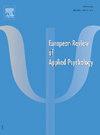通过一系列中介分析,扩展从增加运动到改善饮食和减肥的行为途径,为女性肥胖治疗提供信息
IF 1.4
4区 心理学
Q3 PSYCHOLOGY, APPLIED
European Review of Applied Psychology-Revue Europeenne De Psychologie Appliquee
Pub Date : 2025-04-01
DOI:10.1016/j.erap.2024.101048
引用次数: 0
摘要
试图减肥的行为方法在短期内大部分都失败了。研究表明,人们对治疗过程中发生的心理社会变化的动态认识不足,以及运动对成年肥胖患者体重的直接影响远远超过其对体重的直接影响。目的本研究旨在阐明体重减轻的心理社会预测因素,为行为肥胖治疗提供依据。方法在社区健康促进中心接受认知行为治疗的肥胖女性(N = 103)在6、12和24个月内进行评估。两个系列的中介模型被指定评估从理论驱动的社会心理变量的变化产生的影响。结果治疗对心理社会和行为变量的影响从大到非常大。在系列中介分析中,运动→饮食改变的关系被负性情绪变化→情绪性进食→饮食相关自我效能感、运动相关自我调节变化→饮食相关自我调节变化→饮食相关自我效能感的路径显著中介。在两种中介模型中,负性情绪变化→运动相关自我调节变化和饮食相关自我调节变化→情绪性饮食变化的关系也显著。饮食改善显著预测体重指数在6、12和24个月内的下降,体重减轻6.1%、5.9%和5.0%。结论基于研究结果,对已确定的理论驱动过程在行为肥胖治疗中的应用提出了建议。本文章由计算机程序翻译,如有差异,请以英文原文为准。
Extending a behavioral pathway from increased exercise to improved eating and weight loss via serial mediation analyses to inform obesity treatment in women
Introduction
Behavioral methods attempting to reduce weight have largely failed beyond the very short term. Research suggests an inadequate understanding of the dynamics of psychosocial changes occurring within treatment processes, and how exercise plays a part well-beyond its minor direct effect on weight in adults with obesity.
Objective
This study aimed to clarify psychosocial predictors of weight loss to inform behavioral obesity treatments.
Method
Women with obesity (N = 103) participating in an original cognitive-behavioral treatment within community-based health promotion centers were evaluated over 6, 12, and 24 months. Two serial mediation models were specified assessing effects emanating from changes in theory-driven psychosocial variables.
Results
Treatment-associated effects on the tested psychosocial and behavioral variables were large to very large. Within the serial mediation analyses, the exercise→dietary change relationship was significantly mediated by paths from changes in negative mood→emotional eating→eating-related self-efficacy, and changes in exercise-related self-regulation→eating-related self-regulation→eating-related self-efficacy. Across those two mediation models, relationships of negative mood change→exercise-related self-regulation change, and eating-related self-regulation change→emotional eating change, were also significant. Dietary improvement significantly predicted reductions in body mass index over 6, 12, and 24 months with weight losses of 6.1%, 5.9%, and 5.0%.
Conclusion
Based on findings, suggestions were made for the identified theory-driven processes to be applied in behavioral obesity treatments.
求助全文
通过发布文献求助,成功后即可免费获取论文全文。
去求助
来源期刊

European Review of Applied Psychology-Revue Europeenne De Psychologie Appliquee
PSYCHOLOGY, APPLIED-
CiteScore
2.20
自引率
20.00%
发文量
38
期刊介绍:
The aim of the Revue européenne de Psychologie appliquée / European Review of Applied Psychology is to promote high-quality applications of psychology to all areas of specialization, and to foster exchange among researchers and professionals. Its policy is to attract a wide range of contributions, including empirical research, overviews of target issues, case studies, descriptions of instruments for research and diagnosis, and theoretical work related to applied psychology. In all cases, authors will refer to published and verificable facts, whether established in the study being reported or in earlier publications.
 求助内容:
求助内容: 应助结果提醒方式:
应助结果提醒方式:


